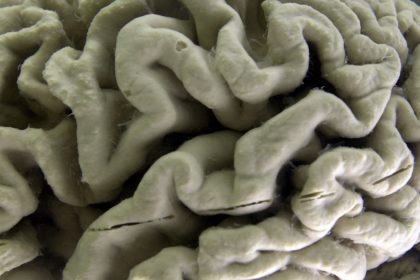Report Looks at Why Antipsychotics Are Being Overprescribed in Nursing Homes

A recent report from the Health and Human Services Department finds that the Centers for Medicare & Medicaid Services needs to improve data used to monitor antipsychotic drugs in nursing homes, as insufficient data underestimates the scope of the antipsychotic overprescribing epidemic.
“This report from HHS confirms that the data CMS uses to track the use of antipsychotics in nursing homes are insufficient and underestimate the full scope of this crisis. The residents of our nation’s nursing homes deserve better than this,” said House Ways & Means Committee Chairman Richard E. Neal, D-Mass.
One of main findings from the HHS report is that in 2018, around 12,091 Part D beneficiaries had a claim for an antipsychotic drug, but were not reported in the minimum data set, which is a mandated quarterly assessment administered to all nursing home residents, as receiving an antipsychotic drug.
Nearly one-third of residents who were reported in the minimum data set as having schizophrenia, a diagnosis that excludes them from CMS’s measure of antipsychotic drug use, did not have any Medicare service claims for that diagnosis.
Even for residents included in the minimum data set counts, the minimum data set did not provide important details about the drug use, such as which antipsychotic drugs were prescribed, at what quantities and strengths, and for what durations.
One explanation for the inconsistency in CMS data is that antipsychotics are often inaccurately prescribed in nursing homes for conditions like Alzheimer’s disease or dementia as a way to restrain elderly residents.
The U.S. Food and Drug Administration states that antipsychotics are not indicated for treatment of dementia-related psychosis, and that elderly patients who do take antipsychotics are at an increased risk for death, typically related to heart failure, sudden death, or pneumonia.
As a result, the FDA put a black box warning on off-label use of antipsychotics indicating these medications are particularly harmful for frail, elderly patients, and can lead to injuries, hospitalizations, and even death.
Previous reports from the Office of Inspector General in 2011 raised quality and safety concerns regarding the high use of antipsychotic medications among nursing home residents, and in 2012 CMS launched the National Partnership to Improve Dementia Care in Nursing Homes to promote comprehensive dementia care and non-pharmacological approaches to care for nursing home residents.
The initiative focused on person-centered care, public reporting, state-based coalitions, research, training, and revised surveyor guidance to effectively reduce use of antipsychotic medications among nursing home residents.
“In 2011 in a fourth quarter report, 23.9% of long-stay nursing home residents were receiving antipsychotic medication. Since then, there has been a decrease of 41% to a national prevalence of 14.1% in 2020 quarter two. Success has varied by state and CMS region, with some states and regions having seen a reduction of greater than 45%,” said a spokesperson from CMS.
However, the HHS report shows that nursing homes continue to use antipsychotics at unnecessarily high rates, with approximately 20%, or about 298,650 people in skilled nursing facilities in the U.S., receiving some form of antipsychotic medication each week in the fourth quarter of 2019, while only 2% had qualifying conditions for such drugs.
“This pattern of overprescribing such dangerous drugs is unacceptable, particularly coupled with the Trump administration’s campaign to loosen regulations designed to protect patients from harm,” said Neal in a written statement.
The Nursing Home Reform Act of 1987 outlawed the inhumane use of chemical and physical restraints for residents of skilled nursing facilities, but citations for antipsychotic misuse in nursing homes still increased by 200% between 2015 and 2017, but declined by 22% from 2017 to 2018.
“Nationally, data show a downward trend in the inappropriate use of antipsychotic medications in nursing homes in the past 10 years, however, there are still states with higher rates relative to the national average, and room for further improvement across most states,” said Sandra Simmons, director of the center for quality aging geriatric research at Vanderbilt University School of Medicine.
Simmons said that reducing antipsychotics is challenging because when nursing homes are dealing with staffing shortages and high rates of staff turnover, it makes it difficult, if not impossible, to consistently implement non-pharmacological interventions in lieu of using medications, and setting up non-pharmacological interventions to address behavioral disturbance requires significant staff time and resources.
Additionally, Simmons has found in her research that elderly patients typically have three or more out-patient providers, who are not always part of the same health care system, causing gaps in the information that gets shared during care transitions.
The pandemic may have increased antipsychotic use among elderly in nursing homes, as it exacerbated challenges like staffing shortages and staff turnover that existed before the pandemic, and also led to higher levels of social isolation imposed on nursing home residents due to COVID-19 care restrictions, which have included the absence of visitors, dining alone in one’s room and no social group activities.
“This likely increased symptoms of depression, anxiety and behavioral disturbance, particularly among those with dementia who may not have understood the reason for these changes in their daily routine,” said Simmons.
Data also suggests that more than 55,000 residents and staff of long-term care facilities have perished from COVID-19, and to complicate matters, new findings show that antipsychotic drugs can have a protective effect against COVID-19.
Two studies, led by the Mental Health Unit of the Virgen del Rocio University Hospital and researchers from the U.S., concluded that antipsychotic drugs could provide some protection against both infection and the tendency to clinical severity of COVID-19 infection.
Based on a sample of 698 patients treated with antipsychotics at the Seville hospital, researchers found that antipsychotics reduced the activation of genes involved in many of the inflammatory and immunological pathways associated with the severity of COVID-19 infection.
Simmons is conducting two clinical trials focused on deprescribing unnecessary medications among hospitalized older adults who leave the hospital, and go to a skilled nursing facility or post-acute care, one of which is funded by the National Institute of Health and Aging and the second trial funded by the VA.
Both trials consider all medications taken by the patient, including over-the-counter medications which can often interact with prescription medications to increase risk or harm.
“We are finding that older patients are taking an average of 15 or more medications when they are enrolled in our studies, this is referred to as ‘hyper-polypharmacy,” said Simmons.
Many older adults meet criteria for hyper-polypharmacy which, in turn, increases their risk for falls, delirium, cognitive impairment, and hospitalization.
To combat this, Simmons will create a comprehensive, thoughtful review of all patient medicines to identify those with the potential for deprescribing, and to engage in a conversation with the patient, and/or their family member, about the decision process, and determine their willingness to stop taking a specific medication or to take less.
If the patient agrees, the health care providers are given a final decision to deprescribe the medication.
“Consumers need to be able to make informed choices about what assisted living facilities can and cannot provide, particularly if they allow aging in place, because care needs often change,” said Simmons.























